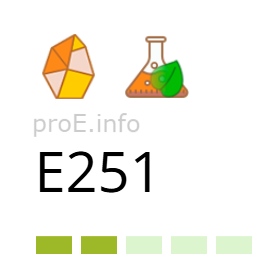
Other names for the additive (synonyms)
General Information
Sodium nitrate (food additive E251) is a crystalline white powder used in the food industry as a preservative and color fixative. It prevents the growth of bacteria and gives meat products a pinkish shade and characteristic taste.
In nature, sodium nitrate occurs relatively rarely, mainly in the form of saltpeter minerals. Industrially, additive E251 is obtained either from natural deposits of sodium nitrate or through chemical synthesis — neutralization of nitric acid with sodium or its compounds.
The chemical formula of sodium nitrate is NaNO3. When heated to high temperatures, additive E251 decomposes with the release of oxygen, which also makes it useful for industrial applications outside the food sector (production of explosives, rocket fuel).
The main physicochemical characteristics of additive E251: good solubility in water, no odor, and a distinctly salty taste.
Effects on the Body
Benefits of Additive E251
Although sodium nitrate is not a substance characteristic of human physiology, some studies indicate potential beneficial effects. In the body, additive E251 is converted into nitrites, which further contribute to the formation of nitric oxide (NO) — an important vasodilating agent. According to clinical studies, sodium nitrate reduces blood pressure and improves endothelial function, especially in people with arterial hypertension. Increased NO levels are also linked to improved glucose metabolism in metabolic syndrome.
Risks of Additive E251
The main danger is not sodium nitrate itself, but its conversion into nitrites and further into methemoglobin or carcinogenic N-nitroso compounds (NOCs). Excessive intake of additive E251 can cause methemoglobinemia, which manifests as cyanosis, dizziness, weakness, cardiac rhythm disturbances, and in severe cases — seizures and respiratory failure.
Long-term consumption of products containing sodium nitrate may lead to the formation of nitrosamines — substances associated with an increased risk of developing stomach, intestinal, and esophageal cancers. Scientific reviews and meta-analyses confirm this association, especially with regular consumption of smoked and preserved foods.
JECFA (Joint FAO/WHO Expert Committee on Food Additives) has established an ADI (acceptable daily intake) for additive E251 at the level of 0–3.7 mg/kg body weight per day. The FDA (USA) holds a similar opinion, noting that the additive is safe in strictly limited amounts.
Studies by EFSA (European Food Safety Authority) confirmed that, when adhering to the acceptable daily intake (ADI), sodium nitrate does not pose a serious risk. At the same time, the committee noted that the contribution of sodium nitrate as a food additive accounts for less than 5% of the total nitrate intake in humans (mainly from vegetables and contaminated drinking water).
To summarize, despite certain risks, when used in controlled amounts, preservative E251 is considered relatively safe. The health hazard arises not so much from additive E251 itself, but from the total intake of nitrates from food.
Uses
In the food industry, additive E251 is used for processing canned foods, sausages, bacon, and other meat products, where it helps improve color, taste, and prevents the growth of Clostridium botulinum bacteria.
Preservative E251 is also commonly used together with additive E252 in cheese production, particularly processed and aged varieties. It is added to prevent product “swelling” caused by gas-producing bacteria such as Clostridium tyrobutyricum. Thanks to this, cheese retains a uniform structure, taste, and quality for a longer period.
In addition, sodium nitrate is also used outside the food sector: in fertilizer production, pyrotechnics, thermal energy storage, and steel pickling processes.
Legal Status
In the European Union, additive E251 is permitted under Regulation (EC) No 1333/2008 — in strictly limited amounts and only in certain products. In the USA and Canada, the use of sodium nitrates is also permitted and regulated, but with a restricted list of allowable concentrations.
International organizations such as JECFA and EFSA have set the acceptable daily intake (ADI) for nitrates at up to 3.7 mg/kg body weight — within this limit, E251 is considered a safe additive.
In some countries, including Norway and Japan, the use of additive E251 is restricted due to potential risks when exceeding the limits, especially in baby food and drinking water.